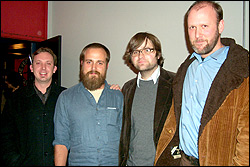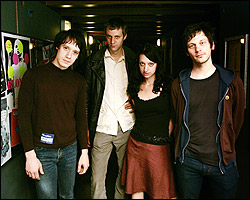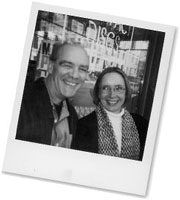FOR ASPIRING songwriters with indie-rock and folk leanings, Eric Bachmann of Crooked Fingers, Sam Beam of Iron and Wine, and Ben Gibbard of Death Cab for Cutie and the Postal Service carry considerable cachet. So it wasn’t surprising when, on Tuesday, Dec. 14, about 90 young writers and musicians filed into the VERA Project’s main showroom and filled the folding chairs—and then some. As moderator and Musician’s Resource Center founder Shawn Rogers cracked a joke about the various styles of facial hair sported by the panelists, it also wasn’t surprising to watch the audience collectively take out its notebooks and pens.
This was the ninth such free-of-charge panel held at the VERA Project and moderated by Rogers, who holds three titles at Sub Pop Records: vice president of international marketing, creative director of TV and film licensing, and A&R. Having moved to Seattle in late 1999 to assume just one title at the label, Rogers left a community-oriented music scene in Chapel Hill, N.C., but says he found an equally supportive one here. Because of his experience in the music business (he managed bands like Archers of Loaf and worked at Mammoth Records and other labels)—and his willingness to help others—he quickly became the de facto go-to guy when bands signed to or affiliated with Sub Pop needed help navigating things like entertainment law, distribution, taxes, and publishing credits. In a way, by starting the Musician’s Resource Center in July of ’03, Rogers was practicing preventive medicine. By producing a panel every six weeks or so, and by making himself and his library of music business resources available at the VERA Project in between, he’s satisfying his urge to be involved in a process that he loves while cultivating growth in our music scene.
“All of this is stuff that bands need to know, but they don’t always know that they need to know it until it’s too late,” Rogers says of his panels. Because so many new and newly signed bands make their way to him eventually anyway, it makes sense to distribute this business information before musicians get down to the wire with negotiating contracts and start frantically seeking advice.
BACK AT VERA, Roger’s segment of the discussion is over and he’s opened the floor to questions. A woolen-hatted self-described new songwriter says he finds that often, after four-tracking ideas, he comes back to them the next day to discover that he’s really just rewritten someone else’s chorus or cribbed a chord progression from a song he loves, and he wants to know what he can do about it.
“I don’t know what you’re talking about, man,” deadpans Bachmann, and his co- panelists crack up. Beam, a former film teacher who talks without moving his mouth so that his deep, low, Southern-drawled dialect seems to come straight from the coarse curls of his beard, offered that by keeping the focus on the process rather than the end result, the problem of constantly suspecting oneself of forgery might not be so crippling. Gibbard recalled a friend who recently brought out the old saw that there are only so many chords, and they all agreed that songwriters are bound to borrow from those they admire.
Rogers told me later that, as evidenced by the popularity of that night’s all-songwriter panel, there’s nothing as valuable to struggling musicians as a working musician’s perspective on things. For future discussions —even those concerned with less-than- creative topics—he’ll make sure that in addition to local professionals like lawyer Michael Barber and national booking agent Ali Giampino, at least one recording artist is on hand to offer his or her point of view. Forthcoming panels, co-sponsored by the Pacific Northwest Chapter of the Recording Academy and held at VERA, will concern topics like how to actually put DIY ideals into practice (how and where to make bulk CDs, how to get those CDs onto retail shelves) and how to get your music on the radio (a particularly dense topic, considering the current state of media consolidation). Rogers also plans to revisit some of the issues handled by previous panelists. Seattle has no shortage of experienced professionals from all sides of the equation, and Rogers seems to have no trouble at all getting them signed on.
Although the Musician’s Resource panel nights started in a side room at VERA and have grown big enough to warrant a move to the main space, because the panels don’t qualify as shows that can be listed in music calendars, it’s been difficult to get the word out to the city’s up-and- coming up-and-comers. If you or someone you know is interested in joining, e-mail musiciansresource@mindspring.com.








